- Home
- Kim Newman
Anno Dracula ad-1 Page 7
Anno Dracula ad-1 Read online
Page 7
The lad had a gift for figures; he could keep in his head at once the details and totals of three separate rounds of varied drinks. That talent, nurtured in Druitt’s classes, might lead him to a position. Georgie might exceed the high-water-mark of his father, and become a landlord rather than a potman.
She took a small table to herself and did not order a drink. She was stopping here just to put off her return to the Hall. She’d have to give a report on the inquest to Jack Seward, and did not just now want to think too much about the last moments of Lulu Schön’s life. As an accordionist murdered ‘The Little Yellow Bird’, a few maudlin drunks tried, with only marginal success, to remember all the words in the right order.
‘Goodbye little yellow bird,’ Geneviève hummed to herself,
‘I’d rather brave the cold, on a leafless tree,
Than a prisoner be, in a cage of gold.’
A group of noisy newcomers barged through the doors, bringing a gust of night’s chill with them. The noise of the pub momentarily abated, and was then redoubled.
Cathy’s prospective beau turned away from the bar, roughly pushing the new-born away. She rearranged a shawl around scab-dotted shoulders, and walked off with broken-heeled dignity. The man was Kostaki, the Carpathian who had been at the inquest. The three who had come in were his fellows, grim examples of the barbarian type Vlad Tepes had imported from his mountain homeland and set loose in London. She recognised Ezzelin von Klatka, a grey-faced Austrian with a close-cropped scalp and a moss-thick black beard. He had a reputation as an animal tamer.
Kostaki and von Klatka embraced, breastplates grinding as they grunted greetings in German, the language of preference for the mongrel Mittel Europäer who constituted the Carpathian Guard. Kostaki made introductions, and Geneviève gathered the others were Martin Cuda, a relative new-born who had not yet seen out his first century, and Count Vardalek, an effeminate and snake-like Hungarian who had the rank in the group.
Woodbridge offered the Guardsmen a pull of the pig, and von Klatka stared him into silence. The Prince Consort’s Own did not favour animal blood. The group had the collective saunter Geneviève associated with Prussians or Mongols, the universal attitude of officers in an army of occupation. Carpathians marched around in a cloud of their own arrogance, condescending as much to the newborn as the warm.
Von Klatka picked a table in the centre of the room and stared down a couple of sailors until they chose to remove themselves to the bar, leaving their whores behind. The knight dismissed two of the girls, a new-born and a warm tart with no teeth, but let stay the last, a self-possessed gypsy who bore with pride the scars on her neck.
The Carpathians took chairs and leaned back in them, evidently at ease. They were illegitimate children of Bismarck and Geronimo: all wore highly polished boots and carried heavy swords, but their uniforms were augmented with oddments scavenged through the years. Von Klatka had around his neck a golden lanyard upon which were strung withered lumps of flesh she understood to be human ears. Cuda’s helmet was adorned with a wolf’s skin: head surmounting the crown and ringing the visor with teeth, eye-sockets sewn shut with red thread; thick-furred hide hanging down to the centre of his back, tail dangling almost to the floor.
Vardalek was the most extraordinary figure, his jacket a puffy affair of pleats and flounces, covered with kaleidoscope designs of spangle and sparkle. His face was powdered to conceal suppurating skin. Pantomime circles of rouge covered his cheeks and a scarlet cupid’s-bow was painted over lips constantly distended by the two-inch fangs. His hair was stiff and golden, elaborately done up in bows and curls, twin braids dangling from the nape of his neck like rat’s tails. This was the Count’s party, and he was being escorted by the others on his tour of the fleshpots. Vardalek was one of those vampires who fussed about how close he was to the Prince Consort, claiming a dynastic connection as well as the obvious tie of bloodline. In a minute’s chatter and on the flimsiest of pretexts, he mentioned the Royal Person no fewer than three times, always with mock-casual prefixes like ‘as I was saying to Dracula...’ or ‘as our dear Prince mentioned the other night...’
The Hungarian surveyed the room and burst into high-pitched giggles, hiding his mouth behind a thin, green-nailed hand that protruded from an explosion of lace at his cuffs. He whispered to von Klatka, who grinned ferally and signalled to Woodbridge.
‘That boy,’ von Klatka said in approximate English, pointing a talon at Georgie. ‘How much for that boy?’
The potman mumbled that Georgie was not for sale.
‘Silly man, you understand not,’ insisted von Klatka. ‘How much?’
‘He’s my son,’ Woodbridge protested.
‘Then you should be honoured indeed,’ shrilled Vardalek. ‘That your plumptious whelp should excite the interest of fine gentlemen.’
‘This is the Count Vardalek,’ explained Cuda, whom Geneviève had marked as the snivelling toady of the group. ‘He is very close to the Prince Consort.’
Kostaki alone sat quietly, eyes forever watchful.
By now, everyone had shut up and was watching. Geneviève was sorry that Thain and the detectives had left, but these bullies were hardly likely to feel outranked by mere policemen.
‘Such a pretty lad,’ said Vardalek, trying to wrestle the youth into his lap. Georgie was stiff with terror, and the elder was strong in the wrist. A long red tongue darted out of his cupid’s bow and scraped Georgie’s cheek.
Von Klatka had out a wallet as fat as a meat pie. He threw a cloud of bank-notes in Woodbridge’s face. The ruddy-cheeked potman went grey, eyes heavy with tears.
‘You don’t want to be botherin’ with the boy,’ said Cathy Eddowes, squeezing between von Klatka and Cuda, slipping her arms around their waists. ‘You gents wants yourselves a real woman, a woman as ’as the equipment.’
Von Klatka pushed Cathy away, shoving her on to the flagstone floor. Cuda clapped his comrade on the shoulder. Von Klatka looked with anger at Cuda and the junior vampire backed away, face a stricken white triangle.
Vardalek still cossetted Georgie, purring Magyar endearments which the Devonshire boy could hardly be expected to appreciate. Cathy crawled to the bar and pulled herself up. Pustules on her face had burst and clear gum was oozing into one eye.
‘Excellencies,’ Woodbridge began, ‘please...’
Cuda stood up and laid hands on the potman. The Carpathian was a foot shorter than the beefy warm man, but the red fire in his eyes made it plain he could rend Woodbridge apart and lap up the leavings.
‘What is your name, darling one?’ Vardalek asked.
‘G-G-Georgie...’
‘Ah-hah, how is your rhyme? “Georgie-Porgie, pudding and pie”?’
She had to intervene. Sighing, Geneviève stood up.
‘Pudding and pie you shall be,’ purred Vardalek, his teeth scraping Georgie’s plump neck.
‘Gentlemen,’ she began, ‘please allow these people to continue unmolested with their business.’
The Carpathians were shocked silent. Vardalek’s mouth gaped open, and she saw that all but his fang-teeth were green ruins.
‘Back off, new-born,’ Cuda sneered. ‘If you know what’s best for you.’
‘She’s no new-born,’ muttered Kostaki.
‘Who is this impertinent little person?’ asked Vardalek. He was licking tears from Georgie’s cheeks. ‘And why is she still un-dead seconds after insulting me?’
Cuda left Woodbridge and flew at Geneviève. Swift as an overcranked zoetrope, she leaned sharply to one side and jabbed an elbow into his ribs as he passed, shooting him across the room. His wolf-helmet came off as he fell, and someone semi-accidentally dumped a pot of slops into it.
‘I am Geneviève Sandrine de l’Isle Dieudonné,’ she declared, ‘of the pure bloodline of Chandagnac.’
Kostaki, at least, was impressed. He sat up straight, as if to attention, bloody eyes wide. Von Klatka noted his comrade’s changed attitude and, without moving from his sp
ot, also withdrew from the confrontation. She had seen a similar attitude a few years ago in an Arizona poker parlour, when a dentist accused of cheating happened to mention to the three hefty cattlemen fumbling with their holster straps that his name was Holiday. Two of the drovers had then shown exactly the expressions worn now by von Klatka and Kostaki. She had not been in Tombstone for the funeral of the third.
Only Count Vardalek was left in the fight.
‘Let the boy go,’ she said, ‘new-born!’
Fury sparked in the Hungarian’s eyes as he pushed Georgie away and stood up. He was taller than her, and almost as old. There was a terrible strength in his arms. His swelling nails turned to dagger-points, the lacquer on them shrivelling like butter on a griddle. He covered the distance between them in a snake’s eye-blink. He was fast but he was of the diseased bloodline of Vlad Tepes. Her hands sprang out and she took a grip on his wrists, halting his finger-knives an inch from her eyes.
Vardalek snarled, foam blotting the powder on his chin, dripping on to the bulbous frills around his neck. His breath was proverbially foul, heavy with the grave. His stone-hard muscles writhed like pythons in her grasp, but she maintained her hold. Slowly, she forced his hands away from her face, raising his arms as if she were setting the hands of a huge clock at ten minutes to two.
In gutter Magyar, Vardalek alleged that Geneviève had regular carnal knowledge of sheep. That the milk from her breasts would poison the she-cats that were accustomed to suckle there. That seven generations of dung-beetles congregated in the hair of her worthless maidenhood. She kissed the air and squeezed, hearing his bones grind together, allowing the sharp points of her thumbs to cut into the thin veins of his wrists. Panic grew in his watery eyes.
Softly, so he alone could hear, she spoke in his own tongue, informing him that she was of the opinion that his ancestors knew only the love of mountain goats and asserted strongly the probability that his organ of generation was as flaccid as a newly-lanced plague bubo. She asked what the Devil was employing for an arse while Vardalak was using that tender part of the diabolic anatomy for a face.
‘Let go him,’ von Klatka said, without authority.
‘Rip out ’is rotten ’eart,’ said someone suffering from an attack of courage now someone else was standing up to the Hungarian.
Vardalek’s knees gave way as she pushed him back and down. He crumpled and sagged, but she still held him up. She made him kneel and he whimpered, looking up almost pitifully at her face. She felt dry air on her canine teeth and knew the muscles of her face were stretched into a beast-like mask.
Vardalek’s head bent back, and his eyes rimmed with blood. His golden helmet of hair slipped, disclosing the angry red scalp his wig concealed. Geneviève let the elder go and he collapsed. Kostaki and von Klatka helped him up, Kostaki almost tenderly setting straight the Count’s wig. Cuda was standing too, and had his sword drawn. Its blade caught the light, silver mixed in with the iron. Disgusted, Kostaki bade him put his weapon away.
Woodbridge had the door open, ready to usher them out. Georgie scurried off to wash Vardalek’s spit off his face. Geneviève felt her face resuming its normal placid-pretty aspect, and stood by mildly. The background chatter resumed and the accordion player, proficient only within a narrow thematic range, started up ‘She Was Only a Bird in a Gilded Cage’.
Von Klatka got Vardalek out into the street and Cuda followed them, filthy tail dragging. Kostaki remained, surveying the wreckage. He looked to where von Klatka had thrown his banknotes and gave a half-grin and a snort. The money had been whisked away as a sponge soaks up spilt beer. The gypsy girl was ostentatiously not where the notes had been. The Guardsman’s white face cracked along lines when he changed expression, but the splits healed over instantly.
‘Lady Elder,’ said Kostaki, saluting her before turning to leave, ‘my respects.’
10
SPIDERS IN THEIR WEBS
He was in Limehouse, somewhere near the Basin. In Beauregard’s experience, the district’s evil reputation was well-deserved. More nameless corpses washed up on the mudflats in a typical night than Silver Knife could account for in three months. With much creaking, rattling and shuffling, the hansom manoeuvred through an archway then came to a dead halt. The cabby must have had to bend double to scrape under the arch.
He gripped the hilt of his sword-cane. The doors were opened for him, and red eyes glittered in the dark.
‘Sorry for the inconvenience, Beauregard,’ purred a silky voice, male but not entirely masculine, ‘but I trust you’ll understand. It’s a sticky wicket...’
He stepped down from the cab and found himself in a yard off one of the warren of streets near the docks. The fog here was wispy, hanging like undersea fronds of yellow gauze. There were people all about. The one who spoke was an Englishman, a vampire with a good coat and soft hat, face in darkness. His posture, studied in its langour, suggested an athlete in repose; Beauregard would not care to go four rounds with him. The others were Chinese, pigtailed and bowed, hands in their sleeves. Most were warm but a massive fellow by the cab-door was new-born, naked to the waist to show off his dragon tattoos and an un-dead indifference to autumn’s chill.
As the Englishman stepped forward, moonlight caught his youthful face. He had pretty eyelashes like a woman’s, and Beauregard recognised him.
‘I saw you get six sixes from six balls in ’85,’ he said. ‘In Madras. Gentlemen and Players.’
The sportsman shrugged modestly. ‘You play what’s chucked at you, I always say.’
He had heard the new-born’s name in the Star Chamber, tentatively linked with daring but somehow amusing jewel robberies. He supposed the sportsman’s involvement in this evident kidnapping confirmed that he was indeed the author of those criminal feats. Beauregard believed even a gentleman should have a profession, and always backed the Players against the Gentlemen.
‘This way,’ said the amateur cracksman, indicating a wet stretch of stone wall. The new-born Chinese pressed a brick and a section of the wall tilted upwards, forming a hatch-like door. ‘Duck down or you’ll bash your bean. Deuced small, these chinks.’
He followed the new-born, who could see in the dark better than he, and was in turn followed by the rest of the party. As the vampire stooped, dragons on his shoulder-blades silently roared and flapped. They proceeded down a sloping passageway, and he realised they were below street level. The surfaces were damp and glistening, the air cold and bad: these chambers must be close to the river. As they passed a chute from which could be dimly heard rippling water, Beauregard was reminded of the nameless cadavers, supposing this place the source of quite a few of their number. The passage widened and he deduced this part of the labyrinth dated back centuries. Objets d’art, mostly of undoubted antiquity and oriental appearance, stood at significant junctures. After many turns and descents and doors, his kidnappers were sure he could never find his way unescorted to the surface. He was pleased to be underestimated.
Something chattered behind a wall and he flinched. He could not identify the animal din. The new-born turned to the noise and yanked the head of a jade caterpillar. A door opened and Beauregard was ushered into a dimly-lit, richly furnished drawing room. There were no windows, just chinoiserie screens. The centrepiece was a large desk, behind which sat an ancient Chinaman. Long, hard fingernails tapped like knifepoints on his blotter. There were others, in comfortable armchairs arranged in a half-circle about the desk. The unseen chattering thing quieted.
One man turned his head, red cigar-end making a Devil’s mask of his face. He was a vampire, but the Chinaman was not.
‘Mr Charles Beauregard,’ began the Celestial, ‘you are so kind to join our wretched and unworthy selves.’
‘You are so kind to invite me.’
The Chinaman clapped his hands, and nodded to a cold-faced servant, a Burmese.
‘Take our visitor’s hat, cloak and cane.’
Beauregard was relieved of his burdens. When th
e Burmese was close enough, Beauregard observed the singular earring, and the ritual tattooing about his neck.
‘A dacoit?’ he enquired.
‘You are so very observant,’ affirmed the Chinaman.
‘I have some little experience of the world of secret societies.’
‘Indeed you have, Mr Beauregard. Our paths have crossed three times: in Egypt, in the Kashmir, and in Shanghai. You caused me some little inconvenience.’
Beauregard realised to whom he was talking, and tried to smile. He assumed he was a dead man.
‘My apologies, Doctor.’
The Chinaman leaned forward, face emerging into the light, fingernails clacking. He had the brow of a Shakespeare and a smile that put Beauregard in mind of a smug Satan.
‘Think nothing of it.’ He brushed away apologies. ‘Those were trivial matters, of no import beyond the ordinary. I shall not prosecute any personal business in this instance.’
Beauregard tried not to show his relief. Whatever else he was, the criminal mandarin was known to be a man of his word. This was the person they called ‘the Devil Doctor’ or ‘the Lord of Strange Deaths’. He was one of the Council of Seven, the ruling body of the Si-Fan, a tong whose influence extended to all the quarters of the Earth. Mycroft reckoned the Celestial among the three most dangerous men in the world.
‘Although,’ the Chinaman added, ‘were this meeting to take place very far to the East, I fancy its agenda would not be so pleasant for you and, I confess, for myself. You understand me?’
Beauregard did, all too well. They met under a flag of truce, but it would be lowered as soon as the Diogenes Club again required him to work against the Si-Fan.
‘Those affairs are not of interest to us at this moment.’
The amateur cracksman turned up the gaslight and faces became clear. The chattering thing burst into its screech and was quelled only by a mild glance from the Devil Doctor. In one corner was a large golden cage, built as if for a parrot with a six-foot wingspan, containing a long-tailed ape. It bared yellow teeth in bright pink gums that took up two-thirds of its face. The Chinaman was renowned for a strange taste in pets, as Beauregard had cause to recall whenever he used his snakeskin-handled boot scraper.

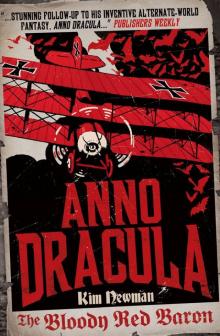 The Bloody Red Baron
The Bloody Red Baron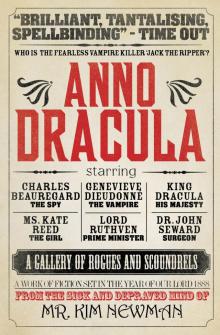 Anno Dracula
Anno Dracula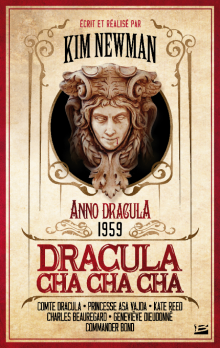 Dracula Cha Cha Cha
Dracula Cha Cha Cha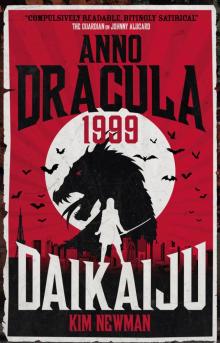 Anno Dracula 1999
Anno Dracula 1999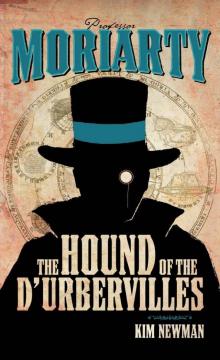 Moriarty: The Hound of the D'Urbervilles
Moriarty: The Hound of the D'Urbervilles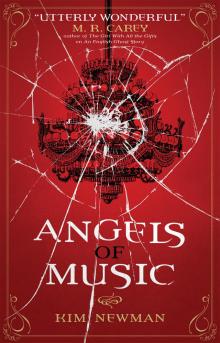 Angels of Music
Angels of Music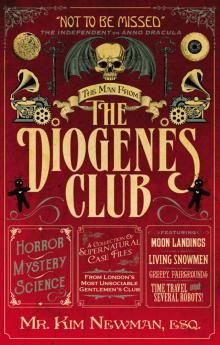 The Man From the Diogenes Club
The Man From the Diogenes Club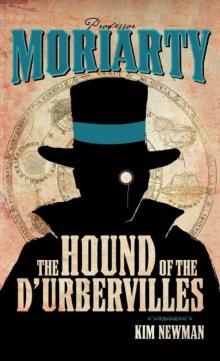 Professor Moriarty: The Hound Of The D’urbervilles
Professor Moriarty: The Hound Of The D’urbervilles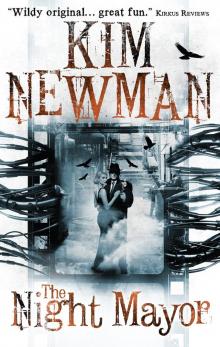 The Night Mayor
The Night Mayor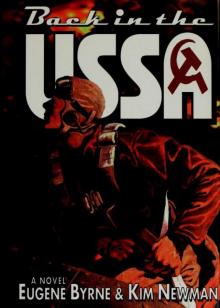 Back in the USSA
Back in the USSA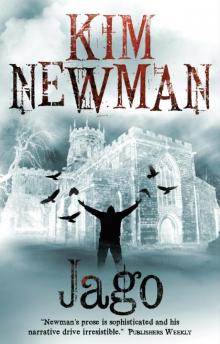 Jago
Jago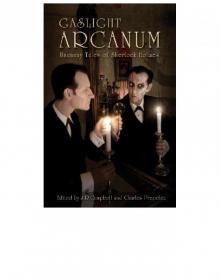 Gaslight Arcanum: Uncanny Tales of Sherlock Holmes
Gaslight Arcanum: Uncanny Tales of Sherlock Holmes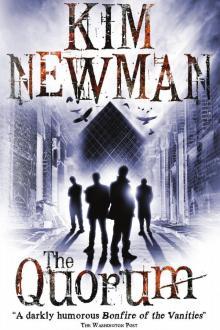 The Quorum
The Quorum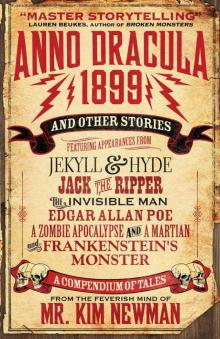 Anno Dracula 1899 and Other Stories
Anno Dracula 1899 and Other Stories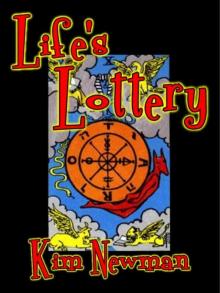 Life's Lottery
Life's Lottery The Secrets of Drearcliff Grange School
The Secrets of Drearcliff Grange School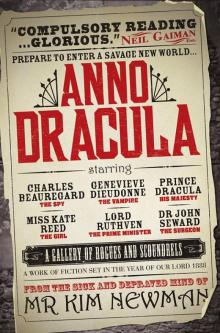 Anno Dracula ad-1
Anno Dracula ad-1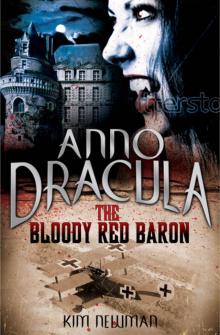 The Bloody Red Baron: 1918 ad-2
The Bloody Red Baron: 1918 ad-2 An English Ghost Story
An English Ghost Story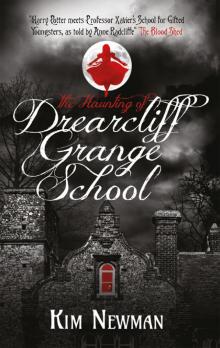 The Haunting of Drearcliff Grange School
The Haunting of Drearcliff Grange School The Other Side of Midnight
The Other Side of Midnight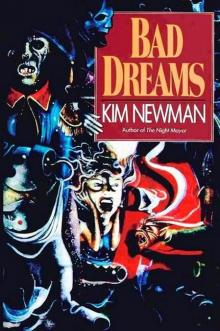 Bad Dreams
Bad Dreams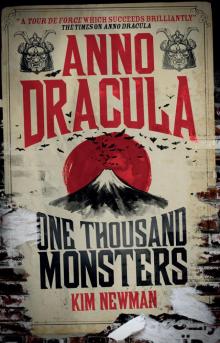 Anno Dracula--One Thousand Monsters
Anno Dracula--One Thousand Monsters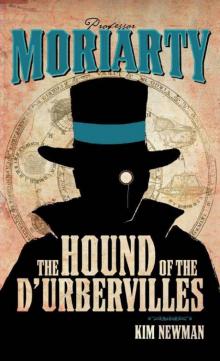 The Hound Of The D’urbervilles
The Hound Of The D’urbervilles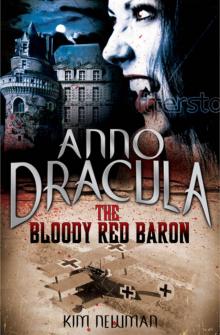 The Bloody Red Baron: Anno Dracula 1918
The Bloody Red Baron: Anno Dracula 1918